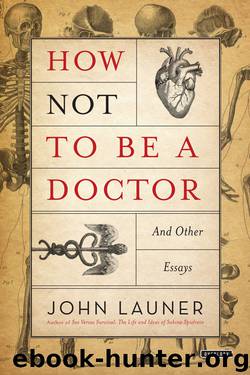How Not to Be a Doctor by John Launer

Author:John Launer [LAUNER, JOHN]
Language: eng
Format: epub
Tags: MED109000, MED074000, MED104000, SCI080000
ISBN: 9781468316322
Publisher: The Overlook Press
Published: 2018-05-01T04:00:00+00:00
31
THE ART OF NOT LISTENING
One of the most gifted psychologists I ever knew had the knack of going to the heart of the matter in any conversation. This could be irritating at times as it made everyone else feel so plodding. Usually it was impressive, because it saved his patients and colleagues so much wasted time and misplaced emotion. It seemed a knack that was well worth acquiring, but if you asked him how he did it, he said, ‘I just tune out a lot.’
It is arresting to think that not listening might be a crucial professional skill. During our basic training as doctors, we spend a great deal of time learning how to listen carefully for patterns of description that fit particular diseases. Later, as we develop the art of consulting, we realise how important it is to pick up not just the verbal signals, but the words in between that hint at such things as disappointment, anger, pleading or despair. I spend a great deal of time in my work as an educator in helping experienced doctors notice how much they normally miss, and in training them – through supervision, group work, video analysis or role play – to improve their capacity to pay attention to what patients say. How strange, then, to hear a renowned psychologist disclose the secret of his expertise as ‘tuning out’.
The claim makes sense, though, at many levels. In biological terms, for example, we are coupled with our environment so that we only notice those forms of information that affect our survival. (We do not see air, for example, simply because it is always there, so we do not need to be able to recognise a vacuum.) Similarly, in social terms, we are habituated to pick up the cues that matter most in our own milieu, but will miss a huge amount if transposed to unfamiliar settings or cultures where nuances of gesture that we do not even notice can either signal politeness or cause huge offence. Roles make a difference too: if one of my children complains to me about an ailment, I listen in a way that is entirely different to how I would listen to a patient. All listening, and all hearing, are innately selective.
In a professional context, I suspect that what we call good listening is in reality a process of conscious, decisive, and closely monitored tuning out. Good listeners may in fact be the people who are exceptionally aware of missing a great deal, accept that this is inevitable, and act accordingly. They manage to make deliberate choices, rather than accidental ones, about what to hear and not hear. They know that some words are clearly weighted by important markers such as repetition, intonation or emotion whereas other words are – relatively speaking – just noise. Conversely, bad listeners (apart from those who just can’t be bothered) may be those who are possessed by the illusion that they can catch everything if they try hard enough. They treat all words as equal, and so they end up responding to random cues rather than significant ones.
Download
This site does not store any files on its server. We only index and link to content provided by other sites. Please contact the content providers to delete copyright contents if any and email us, we'll remove relevant links or contents immediately.
| Administration & Medicine Economics | Allied Health Professions |
| Basic Sciences | Dentistry |
| History | Medical Informatics |
| Medicine | Nursing |
| Pharmacology | Psychology |
| Research | Veterinary Medicine |
Periodization Training for Sports by Tudor Bompa(8247)
Why We Sleep: Unlocking the Power of Sleep and Dreams by Matthew Walker(6693)
Paper Towns by Green John(5174)
The Immortal Life of Henrietta Lacks by Rebecca Skloot(4571)
The Sports Rules Book by Human Kinetics(4377)
Dynamic Alignment Through Imagery by Eric Franklin(4205)
ACSM's Complete Guide to Fitness & Health by ACSM(4048)
Kaplan MCAT Organic Chemistry Review: Created for MCAT 2015 (Kaplan Test Prep) by Kaplan(3998)
Introduction to Kinesiology by Shirl J. Hoffman(3761)
Livewired by David Eagleman(3761)
The Death of the Heart by Elizabeth Bowen(3601)
The River of Consciousness by Oliver Sacks(3592)
Alchemy and Alchemists by C. J. S. Thompson(3509)
Bad Pharma by Ben Goldacre(3419)
Descartes' Error by Antonio Damasio(3270)
The Emperor of All Maladies: A Biography of Cancer by Siddhartha Mukherjee(3140)
The Gene: An Intimate History by Siddhartha Mukherjee(3091)
The Fate of Rome: Climate, Disease, and the End of an Empire (The Princeton History of the Ancient World) by Kyle Harper(3055)
Kaplan MCAT Behavioral Sciences Review: Created for MCAT 2015 (Kaplan Test Prep) by Kaplan(2979)
